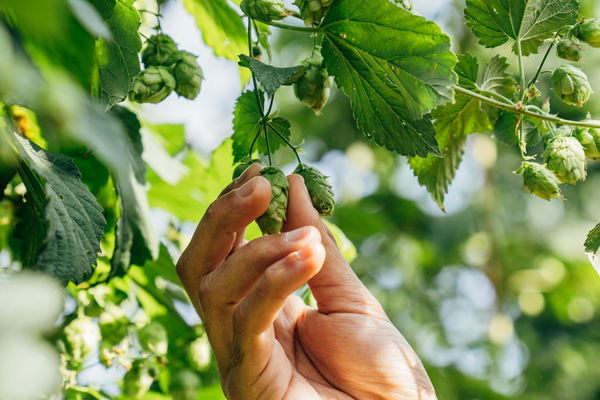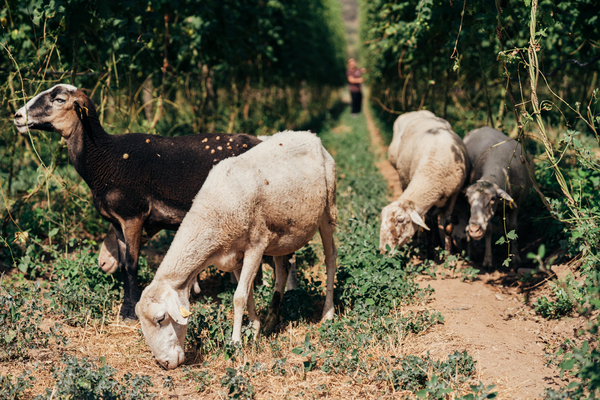Damm’s hop project in Prades is expected to harvest over seven tonnes

The growing of Mediterranean hops in Prades, promoted by Damm in partnership with Prades Town Council and the Prades Agricultural Cooperative, has established itself as a model for agricultural innovation and rural revitalisation
The project to grow Mediterranean hops in Prades, promoted by Damm alongside Prades Town Council and the locality’s farmers’ cooperative, has established itself as a strategic initiative combining agronomic innovation, sustainability and a commitment to the region. With the new harvest about to begin, the company expects to gather over seven tonnes for the brewery’s own consumption during the season.
The beginnings of the project date back to 2014, when the presence of wild hops was detected in the natural setting of Prades in the province of Tarragona. The studies conducted at the time confirmed that the altitude, rainfall and thermal contrast conditions in the environment were very similar to those in the main hop-growing regions of Germany, and, therefore, they made Prades an ideal area for introducing production of the crop. Based on these findings, Damm, Prades Town Council and the town’s Agricultural Cooperative joined forces to launch a project which, from the outset, advocated sustainable rural development and use of the local resources.
Since the start of the first harvest in 2017, the project has undergone sustained growth in terms of the cultivated area and the volume of production. In just three years, production doubled from 3,100 kilos in 2019 to over 6,000 kilos in 2020, demonstrating the viability of growing high-quality hops in the Mediterranean environment. The cultivated area currently covers seven hectares and this year over 7,000 kilos of hops are expected to be harvested. Damm maintains a direct link with the farmers, providing them with technical advice and undertaking to purchase the harvest. It also has its own farm that employs local labour. The harvested hops are then converted into pellets at Damm’s transformation centre, located at the Prades Cooperative’s facilities, thus ensuring that the production cycle is completed within the local area.
Three varieties of hops are grown in the town, selected for their adaptation to the climate and their organoleptic properties: the Nugget variety, with a bitter flavour, and the aromatic Centennial and Willamette varieties. The cultivated area is evenly distributed among the three, allowing for unique sensory and agronomic profiles that give a distinct character to the final beer. These varieties are used to brew some of Damm’s beers, particularly Complot IPA, the brewery’s India Pale Ale renowned for its intense and aromatic character.
A farming model aligned with the principles of regenerative agriculture
In Prades, as in the rest of the national territory, agriculture is suffering from the effects of climate change, especially in the form of droughts that impact crop yields. In the case of the hops in Prades, in order to address the situation, projects are underway to mitigate the impacts in a sustainable manner, adapting the agronomic practices to the new climate context and strengthening the crop’s resilience.
With the aims of improving the soil health, retaining water, reducing the use of external inputs and promoting biodiversity, a regenerative agriculture pilot project has been rolled out in the hop fields in recent years.
The actions that have been implemented include targeted grazing with sheep, which allows for natural weed control without any need for herbicides or strenuous manual work. The sheep feed on the unwanted grass without damaging the seven-metre-high hop plants, as they can only reach the leaves that go up to about one metre. This lower area of the crop is particularly critical, as it doesn’t produce any flowers and it’s where the plants tend to attract greater numbers of fungi and diseases.
Plane cover has also been established between the rows of crops by planting herbaceous species to protect the soil against erosion, improve water and nutrient retention and increase the soil’s microbial biodiversity. Finally, the project includes an ecological fertilisation strategy, based on the use of certified organic products that respect the soil’s natural cycles and promote balanced plant nutrition.
“The hop-growing project in Prades constitutes a firm commitment to innovation at source and an agricultural model deeply rooted in the territory. In addition to ensuring a high-quality and local raw material, we have succeeded in generating value for the community and promoting more sustainable agronomic practices that will enable us to guarantee the long-term viability of the crop”, declared Kevin Tejedera, an agricultural engineer responsible for the project and raw material sustainability at Damm.
A real boost to the local economy
The project to grow Mediterranean hops in Prades also constitutes a lever for economic development and the promotion of employment in rural areas. Thanks to this initiative, local farmers have found a farming alternative with added value. The project, which employs over 25 people throughout the process each year, has diversified the activity of the town’s primary sector, generating new opportunities for the next generation in the countryside and establishing a network of producers committed to sustainable local agriculture.
Moreover, the entire hop transformation process, from drying to pelletising, is carried out entirely in the town, more specifically at Damm’s processing centre located at the Agricultural Cooperative’s facilities, thus preserving the crop’s quality and reinforcing the local character of the project. The whole procedure is supervised by Damm’s technical team, guaranteeing full traceability and a constant quality standard throughout the value chain.



